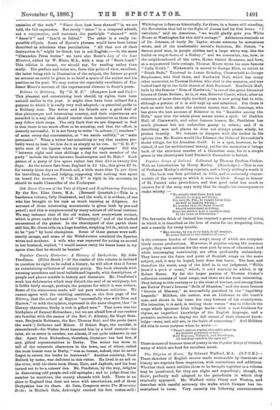Popular Songs of Ireland. Collected by Thomas Crofton Croker. With
an Introduction by Henry Morley. (Routledge.)—This is one of Professor Morley's shilling reprints, and a lively shilling's-worth it is. The book was first published in 1830, and is eminently charac- teristic of the country to which it owes its birth. Songs in honour of St. Patrick take precedence, and that good saint has much to answer for if the song says truly that he taught his countrymen to
make whisky :—
" No wonder that those Irish lads Should be so gay and frisky, For sure St. Pat., he taught teem that, As well al making whisky ;
No wonder that the Saint himself Should understand distilling, Since his mother kept a sheebeen shop In the town of Enniskillen."
The favourite drink of Ireland has inspired a great number of lyrics, in which it is described as the best of cures for the despairing lover, and a remedy for every trouble.
" May whisky, by sea or by land, in all weather, Bo never denied to the children of cure," is the common burden of these songs, many of which are compara- tively recent productions. Moreover, if popular among the common people, they were written for the most part by men of education ; and while encouraging conviviality, are often profoundly melancholy. They have not the force and point of Scottish songs on the same subject, and, it may be hoped, have done less harm. The best, and therefore the worst, song of the kind is, in our judgment, " Willie brew'd a peck o' maul," which, it need scarcely be added, is by Robert Burns. By far the larger portion of Thomas Croker's collection consists of local songs, and these are the most interesting. They belong to this century or to the close of the last, and among them are Father Prout's famous " Bells of Shandon," and the more famous " Groves of Blarney," so successfully parodied in the " Ingoldaby Legends." Milliken, the author, was an Irishman to the heart's oore, and shows in his verse the racy humour of his countrymen. His intention, it is said, in writing these verses " was to ridicule the songs which ignorant Irish village bards—with a vast fondness for rhyme, an imperfect knowledge of the English language, and a pedantic ambition to display the fall extent of their classical know. ledge—were, and still are, in the habit of composing." And Milliken did this to some purpose when he wrote :— " There's statues gracing this noble place in, All heathen goddesses so fair—
Bold Neptune, Plutarch, and Nieedemus, All standing naked in the open air."
There is more of humour than of poetry in the Popular Songs of Ireland, mazy of which are food for excellent mirth.














































 Previous page
Previous page